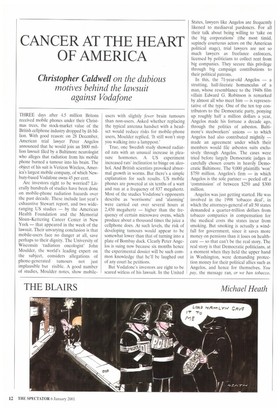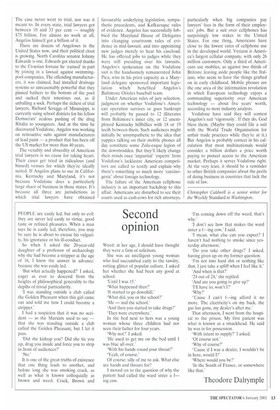CANCER AT THE HEART OF AMERICA
Christopher Caldwell on the dubious
motives behind the lawsuit against Vodafone
THREE days after 4.5 million Britons received mobile phones under their Christmas trees, the stock-market value of the British cellphone industry dropped by £6 billion. With good reason: on 28 December, American trial lawyer Peter Angelos announced that he would join an $800 million lawsuit filed by a Baltimore neurologist who alleges that radiation from his mobile phone burned a tumour into his brain. The object of his suit is Verizon Wireless, America's largest mobile company, of which Newbury-based Vodafone owns 45 per cent.
Are investors right to be worried? Literally hundreds of studies have been done on mobile-phone radiation hazards over the past decade, These include last year's exhaustive Stewart report, and two wideranging US studies — by the American Health Foundation and the Memorial Sloan–Kettering Cancer Center in New York — that appeared in the week of the lawsuit. Their unvarying conclusion is that mobile-users face no danger at all, save perhaps to their dignity. The University of Wisconsin 'radiation oncologist' John Moulder, the world's leading expert on the subject, considers allegations of phone-generated tumours not just implausible but risible. A good number of studies, Moulder notes, show mobile
users with slightly fewer brain tumours than non-users. Asked whether replacing the typical antenna handset with a headset would reduce risks for mobile-phone users, Moulder replied, 'It still won't stop you walking into a lamppost.'
True, one Swedish study showed radiated rats with an unusual increase in pleasure hormones. A US experiment increased rats' inclination to binge on alcohol. And British scientists provoked abnormal growth in worms. But there's a simple explanation for such results. US mobile phones are powered at six tenths of a watt and run at a frequency of 837 megahertz. Most of the studies Vodafone's opponents describe as 'worrisome' and 'alarming' were carried out over several hours at 2,450 megahertz — higher than the frequency of certain microwave ovens, which produce about a thousand times the juice a cellphone does. At such levels, the risk of developing tumours would appear to be somewhat lower than that of turning into a plate of Bombay duck. Clearly Peter Angelos is suing now because six months hence the experimental dossier will be such common knowledge that he'll be laughed out of any court he petitions.
But Vodafone's investors are right to be scared witless of his lawsuit. In the United States, lawyers like Angelos are frequently likened to mediaeval pardoners. For all their talk about being willing to 'take on the big corporations' (the most timid, supinely courteous actors on the American political stage), trial lawyers are not so much lawyers as freelance enforcers, licensed by politicians to collect rent from big companies. They secure this privilege through big campaign contributions to their political patrons.
In this, the 71-year-old Angelos — a strutting, half-literate homunculus of a man, whose resemblance to the 1940s film villain Edward G. Robinson is remarked by almost all who meet him — is representative of the type. One of the ten top contributors to the Democratic party, ponying up roughly half a million dollars a year, Angelos made his fortune a decade ago, through the politics of asbestos. Baltimore's steelworkers' unions — to which Angelos had also contributed mightily — made an agreement under which their members would file asbestos suits exclusively through Angelos. The cases were tried before largely Democratic judges in carefully chosen courts in heavily Democratic Baltimore. The 9,000 plaintiffs 'won' $750 million. Angelos's firm — in which Angelos is the sole partner — peeled off a 'commission' of between $250 and $300 million.
Angelos was just getting started. He was involved in the 1998 'tobacco deal', in which the attorneys-general of all 50 states demanded a quarter-trillion dollars from tobacco companies in compensation for the medical costs the states incur from smoking. But smoking is actually a windfall for government, since it saves more money on pensions than it loses on healthcare — so that can't be the real story. The real story is that Democratic politicians, at a moment when they held the upper hand in Washington, were demanding protection money for their political allies such as Angelos, and hence for themselves. You pay, the message ran, or we ban tobacco.
The case never went to trial, nor was it meant to. In every state, trial lawyers got between 10 and 33 per cent — roughly S75 billion. For almost no work at all, Angelos himself got a billion of it.
There are dozens of Angeloses in the United States now, and their political clout is growing. North Carolina senator Johnny Edwards is one. Edwards got elected thanks to the Croesian fortune he 'earned' in part by joining in a lawsuit against swimmingpool companies. The offending manufacturers, it was claimed, had installed drainage systems so unreasonably powerful that they pinned bathers to the bottom of the pool and sucked their intestines out, as if unballing a sock. Perhaps the richest of trial lawyers, Richard Scruggs of Mississippi, is currently suing school districts for his fellow Democrats' zealous pushing of the drug Ritalin to youngsters. And at the time he discovered Vodafone, Angelos was working on retroactive suits against manufacturers of lead paint — a product that has been off the US market for more than 40 years.
The venality and absurdity of American trial lawyers is no cause for taking heart. Their cases get tried in ridiculous (and biased) venues for which they're ideally suited. If Angelos plans to sue in California, Kentucky and Maryland, it's not because Vodafone does a particularly large share of business in those states. It's because all three arc jurisdictions in which trial lawyers have obtained favourable underlying legislation, sympathetic precedents, and Kafkaesque rules of evidence. Angelos has successfully lobbied the Maryland House of Delegates into changing courtroom rules of evidence in mid-lawsuit, and into appointing new• judges merely to hear his caseload. He has offered jobs to judges while they were still presiding over his lawsuits. Angelos's spokesman on the Vodafone suit is the handsomely remunerated John Pica, who in his prior capacity as a Maryland delegate sponsored important legislation which benefited Angelos's Baltimore Orioles baseball team.
Under American rules of jury selection, judgment on whether Vodafone's American operation survives or goes bankrupt will probably be passed to 12 illiterates from Baltimore's inner city, or 12 unemployed Kentucky hillbillies with 18 or 19 teeth between them. Such audiences might initially be unsympathetic to the idea that yuppies talking on their mobile phones all day constitute some Zola-esque legion of the downtrodden. But they'll likely change their minds once 'impartial' experts' from Vodafone's lacklustre American competitors are called to testify and explain why there's something so much more 'carcinogenic' about foreign technology.
The failure of the American cellphone industry is an important backdrop to this affair. Americans are disturbed to see their courts used as cash-cows for rich attorneys, particularly when big companies pay lawyers' fees in the form of their employees' jobs. But a suit over cellphones has surprisingly low stakes in the United States. For one thing, Americans have close to the lowest rates of cellphone use in the developed world. Verizon is America's largest cellular company, with only 26 million customers. Only a third of Americans use mobiles, as against two thirds of Britons; leaving aside people like the Italians, who seem to have the things grafted on in early childhood. Mobile phones are the one area of the information revolution in which European technology enjoys a commanding superiority over American technology — about five years' worth, according to most industry analysts.
Vodafone have said they will contest Angelos's suit 'vigorously'. If they do, God bless them. (Maybe they could file a suit with the World Trade Organisation for unfair trade practices while they're at it.) But Angelos is probably correct in his calculation that most multinationals would consider a billion dollars a price worth paying to protect access to the American market. Perhaps it serves Vodafone right. At the very least, it should be a reminder to other British companies about the perils of doing business in countries that lack the rule of law.
Christopher Caldwell is a senior writer for the Weekly Standard in Washington.



















































 Previous page
Previous page